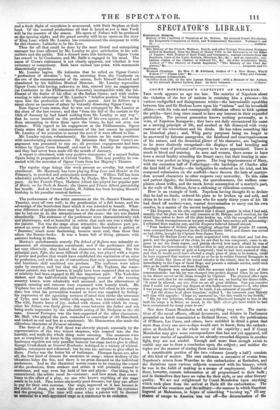The performance of the artist amateurs at the St. James's
Theatre, on Tuesday, went off very well; to the gratification of a full house, and the advantage of the benevolent fund which it was intended to benefit. What- ever difference of opinion there may be as to the merits of the acting, there can be but one as to. the attractiveness of the scene: the eye was feasted abundantly. The costumes of the performers were characteristically rich and picturesque, and so beautiful in colour that each one was a study for the painter. Nor was the stage alone attractive: the audience part pre- sented an array of female charms that might have furnished a gallery of "Beauties," much more fascinating, because more real, than those that adorn the Beauty-books. It was a house full of living pictures, with painters looking at them.
Morton's melodramatic comedy The School of Reform was tolerably re- presented, all circumstances considered; and if the performers did not act very effectively, they looked the characters to admiration. But the principal part, Tyke, the most difficult of the set, was played with a degree of power and pathos that would have established the reputation of an actor by profession, and with an air of naturalness that only spontaneous feeling and histrionic skill combined can produce. The audience were taken quite by surprise; and but that the person of Mr. Topham, the water- colour painter, was well known, it might have been supposed that an actor of celebrity had been engaged to fill this important part. The Yorkshire dialect, and the half-clownish half-swaggering manner of the cunning country knave, were admirably well assumed; and the alternations of roguish cunning and remorse were expressed with homely truth. Mr. Topham has not sufficient physical power to give full effect to his concep- tion; but what his personation wanted in force was supplied by feeling: his expression of the agonizing tortures of mind that choke the utterance of Tyke and make him writhe with anguish, was intense without rant. The wild, frantic burst of joy, dashed with shame, with which he recog- nizes his father, was finely given: this scene between the father and son being made impressive by the admirable acting of Mr. Dodgson as the old man. General Tarragon was the best-supported of the other characters: Mr. Hall, who played the part, reminded us somewhat of old Blanchard, and looked as red and hot as a capsicumb. Mr. Hammerton also made the ridiculous character of Ferment amusing. The farce of A Day Well Spent was cleverly played; especially by the representatives of the two truant shopmen, who entered into the fun heartily, and made the whole thing most amusing. The amateurs were not so completely at home in tke extravaganza of Bombast& Furioso; for burlesque requires not only peculiar humour but stage tact to give it effect. George Cruikshank as General Bombastes indulged in a variety of whimsi- calities, extempore and rehearsed; but he was too nervous to give effect to them. Fusbos was the better bit of burlesque. Pleasant farces are, after all, the best kind of dramas for amateurs to essay: where drollery of the situations helps the fun, and there is no great demand on the individual performers. And as the theatrical mania seems to be running the round of the professions, from authors and artists it will probably extend to musicians, and may even lay hold of law and physic. One thing, be it remembered, the artists excel in—costume: and how much that contri- butes to the effect of a play, no one who knows anything of the stage needs to be told. Fine actors are mostly good dressers; but they can afford to pay for their own costume. Our stage, improved as it has become in the article of dress, yet wants the artist's eye to regulate the costumes and the grouping. The time will come when a painter will be deemed u essential to a well-appointed stage ft n conductor to an orchestra.


























 Previous page
Previous page